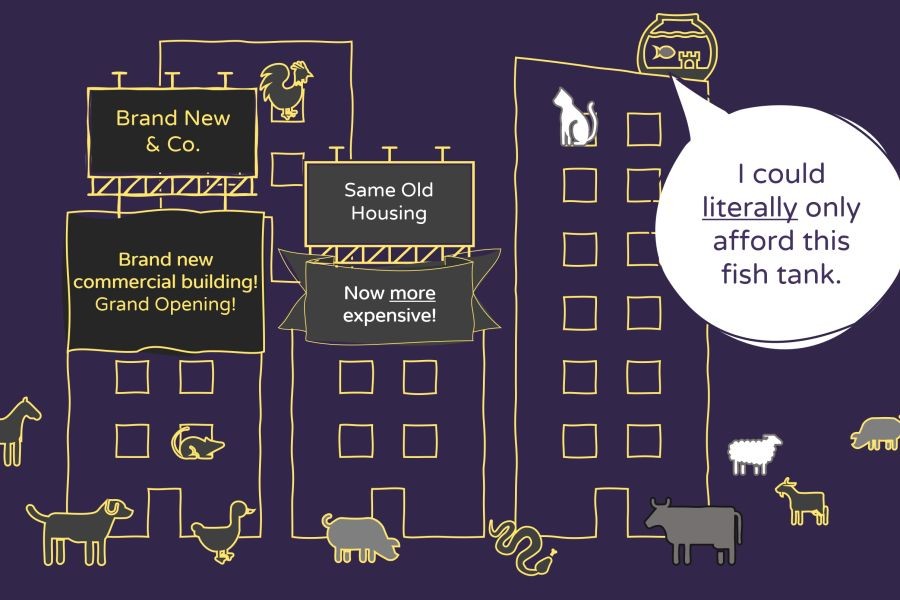In the burgeoning cityscape of Auckland, the cost of living has become an increasingly urgent concern for Kiwis. Underlying this issue is a lesser-discussed factor: local councils' policies and decisions that are quietly enabling rent hikes. This phenomenon is not just a financial burden but a complex economic issue that requires a deeper understanding of New Zealand's housing market dynamics, regulatory frameworks, and economic policies.
Understanding the Urban Housing Market in Auckland
Auckland's housing market is a microcosm of broader national trends. With a population surpassing 1.6 million, the demand for housing in Auckland has consistently outpaced supply, leading to rising property prices and rents. According to a 2023 report by Stats NZ, Auckland saw a 12% increase in median rent prices over the past year. This spike is not solely due to market demand; council decisions regarding land use and development also play a significant role.
The Role of Council Policies in Rent Hikes
Local councils in Auckland hold substantial authority over zoning laws, building regulations, and land development approvals. These policies can either mitigate or exacerbate housing affordability issues. For instance, restrictive zoning laws limit the availability of new housing developments, thereby increasing competition for existing properties and driving up rents.
Moreover, councils' land rates and charges for infrastructure development can significantly impact rental prices. A recent study by the Reserve Bank of New Zealand highlighted that additional costs borne by developers—often passed onto tenants—contribute to rent increases by as much as 15% in some areas.
Case Study: The Impact of Zoning Laws
Consider a recent case in the suburb of Mount Eden, where a proposed multi-unit housing development faced strict zoning restrictions. The council's refusal to rezone the area for higher-density housing stymied the project, thereby limiting the supply of potential rental properties. As a result, rents in Mount Eden have surged by 9% over the last year, as reported by the New Zealand Property Investors' Federation.
Balancing Development and Preservation: A Double-Edged Sword
While councils aim to preserve the character of Auckland's distinct neighborhoods, this often comes at the cost of housing affordability. The delicate balance between development and preservation is a contentious issue, with opposing views on the best path forward.
On one hand, preserving neighborhood character maintains property values and cultural heritage. On the other hand, it restricts the supply of affordable housing, contributing to the rent crisis. This tension is evident in council meetings where community groups frequently clash with developers seeking to increase housing density.
Pros and Cons of Current Council Approaches
- Pros: Preservation of neighborhood character, stable property values, and cultural heritage conservation.
- Cons: Limited housing supply, increased rent prices, and reduced affordable housing options.
Myths and Misconceptions About Rent Control
There are several myths surrounding rent control that need to be debunked to understand the real dynamics at play.
- Myth: Rent control is the ultimate solution to high rents.
- Reality: While rent control can provide short-term relief, it can also deter new housing developments, exacerbating the supply issue in the long run (Source: Ministry of Business, Innovation and Employment).
- Myth: Increased housing supply will automatically lower rents.
- Reality: Without addressing infrastructure and land-cost issues, merely increasing supply may not lead to significant rent reductions (Source: NZ Housing Report).
Encouraging Sustainable Solutions: A Path Forward
To address the housing affordability crisis effectively, it is crucial to adopt sustainable, balanced strategies. This includes revising zoning laws to allow for higher-density developments while ensuring that infrastructure can support growth.
Furthermore, councils can incentivize the development of affordable housing through tax incentives or subsidies for developers who commit to building low-income housing units. These strategies, if implemented, could alleviate some of the financial pressures on renters.
Case Study: Successful Implementation in Wellington
Wellington has adopted a progressive approach by easing zoning restrictions and providing incentives for developers to build affordable housing. This initiative has resulted in a 7% reduction in median rent prices over the past two years, as reported by the Wellington City Council. The success of Wellington's strategy offers a replicable model for Auckland.
The Future of Auckland's Housing Market
Looking ahead, the trajectory of Auckland's housing market will largely depend on how effectively councils can balance development with preservation. According to a 2024 report by the Reserve Bank of New Zealand, if current trends continue, Auckland could see a further 10% increase in rent prices by 2025.
However, by embracing innovative urban planning strategies and fostering collaboration between councils, developers, and residents, Auckland can create a more equitable housing landscape. This will require a shift in policy priorities, focusing on long-term sustainability and affordability.
Final Takeaways
- Local councils play a critical role in influencing rent prices through zoning laws and land development policies.
- Balancing neighborhood preservation with housing development is crucial for addressing Auckland's rent crisis.
- Sustainable solutions, such as incentivizing affordable housing developments, can mitigate rent hikes.
- Wellington's successful approach offers a model for sustainable urban development in Auckland.
As the conversation around housing affordability in Auckland continues, it is imperative for all stakeholders to engage in meaningful dialogue and explore innovative solutions. What’s your perspective on Auckland’s housing challenges? Share your thoughts and strategies for a more affordable future below!
People Also Ask
- How do council policies impact rent prices in Auckland? Council policies like zoning laws and land rates directly influence housing supply and development costs, affecting rent prices significantly.
- What are some common misconceptions about rent control? A common myth is that rent control alone can solve high rent issues; however, it often limits housing development, worsening supply constraints.
- How can Auckland address its rent crisis? By revising zoning laws, incentivizing affordable housing, and fostering collaborative urban planning, Auckland can work towards more sustainable housing solutions.
Related Search Queries
- Impact of zoning laws on Auckland housing
- Auckland rent control policies
- Affordable Housing Initiatives in New Zealand
- Wellington housing market trends
- New Zealand urban planning strategies
- Future of Auckland real estate
- Local council influence on property markets
- Sustainable Urban Development in New Zealand
- Housing affordability solutions NZ
- Economic impact of rent hikes in Auckland































